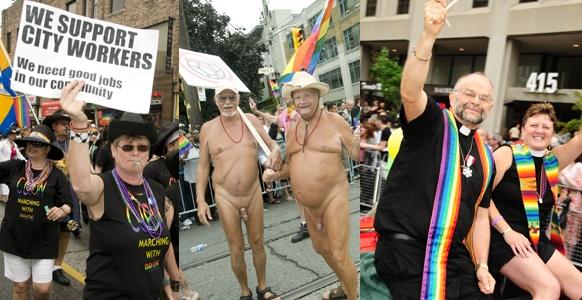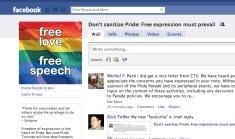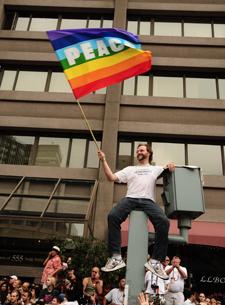
Credit: photos by Nicola Betts and Peter Bevan

Credit: photos by Nicola Betts and Peter Bevan

El-Farouk Khaki Credit: Matt Mills photo

Members of Queers Against Israeli Apartheid in the 2009 Toronto Pride Parade. Credit: Peter Bevan photo

Credit: Peter Bevan photo
Pride Toronto has rescinded its sign-vetting policy, ending a difficult two weeks for the organization.
Responding to community outrage, largely voiced on Facebook and Twitter, Pride Toronto (PT) issued an open letter to the community on March 23:
“The Board of Directors of Pride Toronto has listened to feedback from the community, and the proposed plan for an Ethics Committee to review and approve all messaging prior to the Parade, Dyke and Trans March has been withdrawn. The process followed during the 2009 festival will remain in place for 2010.”
That statement ends one chapter in a very public spat. But many of the issues that made the sign controversy such a flashpoint — free expression, Middle Eastern politics, the role of small-c and capital-C conservatives in the gay movement, and the increasingly prominent place for corporate sponsors at the parade — remain.
It all started two weeks earlier, on March 10, when Pride Toronto released a short, cheerful-sounding announcement.
Everyone marching in the Pride Parade would be asked to “ensure that messages support the theme of the 2010 festival,” according to a press release published to its website.
Despite the tone, there was an edge to the release.
“Participating groups must agree… to have their messages and signage approved by the ethics committee of Pride Toronto in advance of the event. Groups who fail to cooperate with the new practices will be denied permission to take part or removed from the line-up if necessary.”
Pride Toronto co-chair Jim Cullen was quoted as saying the policy was a way of “promoting freedom of expression and diversity.”
Social media exploded. Tweeters turned snarky, and a protest page on Facebook quickly shot up to more than 1,000 members. Members of Queers Against Israeli Apartheid (QuAIA) said the policy appeared to be aimed at them.
For most queers who posted their concerns on Xtra.ca, Facebook and Twitter, their anger had little to do with QuAIA or any other specific group. The issue was censorship.
And those concerns were exacerbated by the slick doublespeak of the announcement, according to writer David Demchuk and others who gathered online.
It wasn’t long before all the sunshine had drained out of Pride’s communications.
Cullen gave a clenched-jaw interview for Xtra, in which he insisted the new policy had nothing to do with QuAIA.
Tracey Sandilands, Pride Toronto’s executive director, tried to rebuff a Facebook group by telling members that “lies and misinformation” were being spread about her organization. Her post sparked more ridicule than reconciliation.
The following week, Sandilands was more upbeat, promising that Pride would circulate a detailed freedom-of-expression policy before adopting it.
But by then, anti-censorship queers had set up a letter-writing campaign, and queers were venting their (sometimes tangentially) related concerns about Pride at several internet hubs. Some members of the Facebook group began tracing the policy back to focus groups run over the winter by conservative PR firm Navigator.
At the same time, Toronto’s queer literati took up the cause, including novelist Zoe Whittall, poet RM Vaughan and playwright Brad Fraser.
The stakes were raised again when both queers in favour and opposed to the sign-vetting rule began emailing their protest directly to Pride Toronto’s sponsors.
Call for further action — including boycotting the Pride Parade and staging an alternative Pride a week earlier — reached a fevered pitch in the days before PT’s reversal.
Questions remain about how political signs at the parade will be handled, since the Parade Terms and Conditions still contain a lengthy clause about messaging. While signs will no longer be vetted in advance, folks with controversial signs can still get ejected on the day of the parade.
Calls to Genevieve D’Iorio and Jim Cullen, the co-chairs of PT were not available for comment. Executive director Tracey Sandilands, when reached at her office, directed inquiries to the board.
“It’s the board that’s driving the policy,” she told Xtra Mar 23. “I’m not sure if it’ll make everyone happy, or if people will think it’s too little too late.”
—with files from Scott Dagostino, Cate Simpson and Matt Mills
Download Pride Toronto’s latest press releases, financial docs and more
pridetoronto.com.
ANATOMY OF A MOVEMENT
—Matt Mills
Xtra published Cate Simpson’s story on Pride’s new sign-vetting policy on March 11. That same day Rick Telfer registered the Don’t sanitize Pride Facebook group. Since then membership in it has swelled to more than 1,500 members, and Pride Toronto has changed its course. Telfer spoke with Xtra’s Matt Mills on March 23.
Here’s what he said:
Pride’s change of heart reflects a reaction from the wider community. It was such an outcry and outpouring of concern about the new policy, it was clear the board of directors needed to assume its proper role and get back in the drivers’ seat. My sense is that the board may not have been entirely involved in the policy development process and once they realized they were asleep at the wheel, they risked losing legitimacy. I think it’s a really good sign and it shows that a little online activism can have an impact in a fairly significant way.
I started the Facebook group simply because I learned about this new censorship policy. As we moved ahead, a whole range of other issues came to the fore, including, deep community concern about the increasing corporatization of Pride, and the community’s democratic involvement in setting the direction for Pride celebrations.
It’s literally a case where people need to break down into committees and talk about who’s going to tackle which issue and then start working it.
I don’t think the overarching goal should be to get anybody. It’s not about cutting throats; it’s about peering into the organization that runs our Pride and figuring out if it serves the interests of the community, or if it is serving the interests of individuals within the community. Some of it will happen through online activism, but online activism can only go so far. When you want to actually figure out an organization, you have to actually get involved with it on a personal level.
TIMELINE: THE UNRAVELLING OF PRIDE
May 23, 2009
After being named 2009 Pride Toronto (PT) grand marshal, Toronto lawyer, activist and Salaam: Queer Muslim Community founder El-Farouk Khaki introduces speakers at a Queers Against Israeli Apartheid (QuAIA) event at Buddies in Bad Times Theatre.
May 28, 2009
After Frank Dimant, executive VP of B’nai Brith Canada, calls for PT to take disciplinary action against Khaki for contravening Pride’s anti-discrimination policy, National Post runs a story on the kerfuffle under the headlines “Anti-Zionists banned from Pride Parade,” and “Protests prohibited.” In it, then-new PT ED Tracey Sandilands says Khaki has promised PT that he will “never under any circumstances speak on the Israeli issue from a Pride point of view…. We will be very much more careful this year,” she says. “We will make sure that we have a presence to ensure that people don’t slip into the parade.”
June 28, 2009
QuAIA, Khaki and scores of other politicians and political groups march in the parade without incident.
January 2010
PT conducts a series of focus groups to, it says, “help shape Pride Toronto’s strategy for community involvement and communications from now through to WorldPride in 2014.” Third-party emails circulate urging opponents of QuAIA and Totally Naked Toronto Men to apply for the focus groups in an effort to persuade Pride to alienate those groups.
February 11, 2010
PT announces changes to the grand marshal selection process. Final selections will be made by a jury of peers, instead of a public voting process. “We are revisiting a number of our processes to see how we can better advance our mission and vision,” says Sandilands.
March 10, 2010
PT issues a press release about terms and conditions for participation in the parade. It reads in part, “Participating groups must agree to… have their messages and signage approved by the ethics committee of Pride Toronto in advance of the event. Groups who fail to cooperate with the new practices will be denied permission to take part or removed from the line-up if necessary.”
March 11, 2010
The Don’t Sanitize Pride: Free Expression Must Prevail Facebook group is launched. More than 1,500 people join over the next two weeks.
March 15, 2010
Xtra anonymously receives copies of two emails. The first, dated March 10, from the Simon Wiesenthal Center to Sandilands, offers to help promote Pride in return for a “clearer statement on Pride’s position on QuAIA.” The second, from conservative PR firm Navigator, advises PT to hold steady in spite of the backlash. It reads in part, “Pride’s decisions were not made based on any particular group or term, and we will not prejudge applications. Period.”
March 16, 2010
Sandilands tells Xtra that Pride staffers were aware there was a move afoot to influence the January focus groups, and that the organization moved to keep those people out.
March 17, 2010
Cathy Gulkin tells Xtra that she participated in a Jan 26 Pride focus group that was “clearly stacked.”
March 23, 2010
PT announces it will drop its policy of vetting signs in advance of the parade. However, a detailed messaging policy remains on the books, meaning offensive signs could still be turfed on the day of the parade.


 Why you can trust Xtra
Why you can trust Xtra


